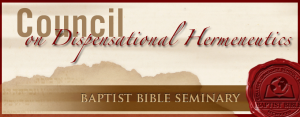I recently finished reading The Pastor Theologian: Resurrecting an Ancient Vision (Zondervan) by two pastors Gerald Hiestand and Todd Wilson. It was quite interesting. I recommend it to you for your consideration although at certain points, which I will not go into here, I have some disagreements. But the good thing about the book is its desire to have theological thinking done by pastors in our churches. In fact, the divide between the Academy (the Seminaries) and the Church is a concern they are trying to address. There is a ditch on each side of the road. I have seen men who can parse every Greek and Hebrew verb but don’t seem to have any great desire to walk across the street and tell somebody about Jesus. On the other hand, I have had lunch with pastors who, after we have gone through the Roman’s Road, have nothing to talk about. Academic minutiae on one side. Shallowness on the other. God spare us from both. At Baptist Bible Seminary where I serve we have tried to bring balance to our training of pastors. Even our seminary journal is named The Journal of Ministry and Theology for a reason. We are a resource for the Church. The book I mentioned at the start of this blog is one attempt to bring balance from one side of the ledger.
Archive for August, 2015
I am going to try to pick up my blogging again and perhaps speed it up, Lord willing. I plan to do more personal things on Facebook (where my activity has picked up) but more academic/technical things on our-hope.org. I have been asked to speak at the Pre-Trib Study Group this coming December giving an analysis of Sam Storms’ book Kingdom Come which I blogged about a few times. I hope to finish my string of blogs in response to Sam’s points which I had started to do. My paper at the Pre-Trib Study Group will be an expansion of the paper I delivered at the Council on Dispensational Hermeneutics last year. I want to be constructive in my criticism and not bombastic in my disagreements. Please pray for me on this.
For this blog post, however, my main thought goes ahead to the upcoming Council meeting in September which I advertised in my last blog. My presentation is entitled “What Do Israel and the Church Share from a Traditional Dispensational Viewpoint?” I want to help traditional dispensationalists do a full-blown theology and not just hammer the distinction between Israel and the Church (which I firmly accept) as a matter of polemics in our debate with replacement theology. In doing this, one area that gives me pause is the constant use by dispensationalists of the distinction between Israel and the Church as a theological switch that provides proof for the pre-trib rapture. This argument would be more plausible if the distinction has been proven to be absolute on other grounds before we get to the rapture question. To be sure, some dispensationalists in the tradition have argued for a pretty absolute distinction by keeping the Church out of the future earthly kingdom. In addition, Lewis Sperry Chafer’s view of two distinct new covenants was at least partly caused by his desire to make the Israel-Church dichotomy more absolute. As to the idea that the Church as a heavenly elect will have no part in the future earthly kingdom, this seems to be countered by Luke 19:11-27 and like passages. As to the idea of two new covenants, very few dispensationalists today hold such a view. The book I edited entitled “Dispensational Understanding of the New Covenant” shows three views defended, none of which are the two new covenants view. No one showed up to defend this view at the Council when we discussed it.
The eighth annual Council on Dispensational Hermeneutics has been scheduled for September 16-17, 2015 at Baptist Bible Seminary in Clarks Summit, Pennsylvania. Our topic this year is “Dispensationalism, Israel, and the Church.” I am doing a paper on what Israel and the Church share from a traditional dispensational point of view. I believe that we often times spend all of our time discussing the distinctions. This is appropriate since it marks dispensationalism as unique. However, Israel and the Church do share some things in God’s design for those institutions. We must not lose sight of that side of things. I am looking forward to the interaction at our Council. Anyone is welcome to attend as an observer. There is no charge for the two-day Council. For more information for registration see http://www.bbc.edu/council. 
